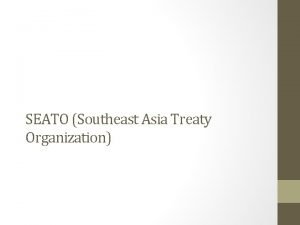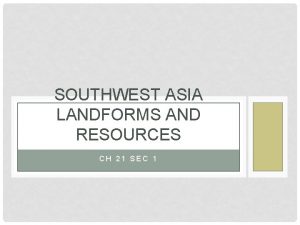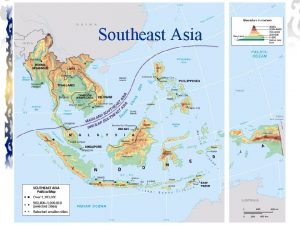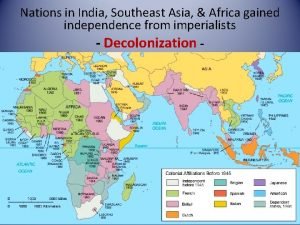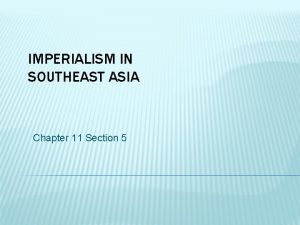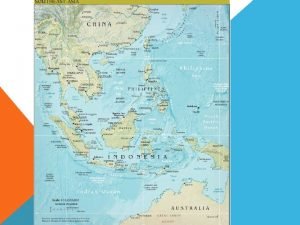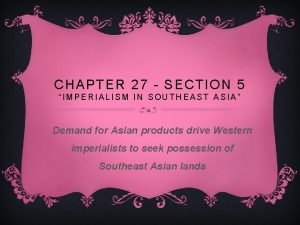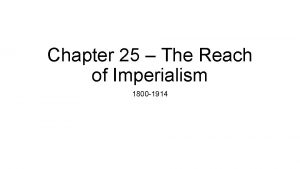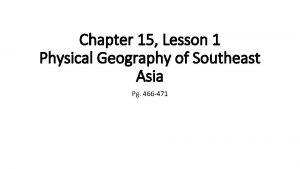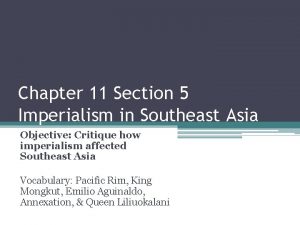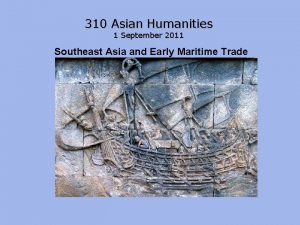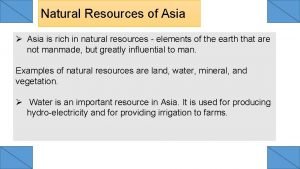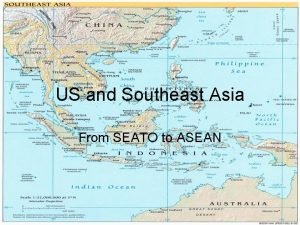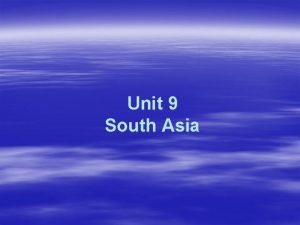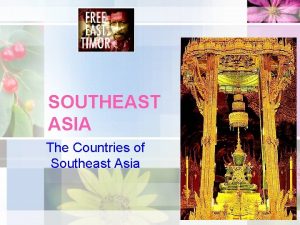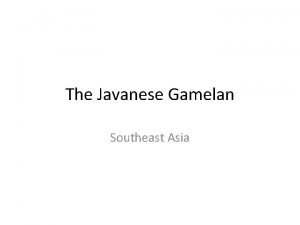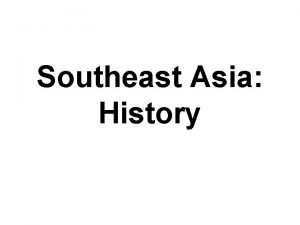SEATO Southeast Asia Treaty Organization Introduction The South












- Slides: 12

SEATO (Southeast Asia Treaty Organization)

Introduction • The South East Asia Treaty Organization (SEATO) was an international organization for collective defense in Southeast Asia created by the Southeast Asia Collective Defense Treaty, or Manila Pact, signed in September 1954 in Manila, Philippines. • The formal institution of SEATO was established on 19 February 1955 at a meeting of treaty partners in Bangkok, Thailand. • The organization's headquarters were also in Bangkok. Eight members joined the organization.

Cont… • Primarily created to block further communist gains in Southeast Asia, SEATO is generally considered a failure because internal conflict and dispute hindered general use of the SEATO military; however, SEATO-funded cultural and educational programs left long-standing effects in Southeast Asia. • SEATO was dissolved on 30 June 1977 after many members lost interest and withdrew.

Origins and Structure • The Southeast Asia Collective Defense Treaty, or Manila Pact, was signed on 8 September 1954 in Manila, as part of the American Truman Doctrine of creating anticommunist bilateral and collective defense treaties. • These treaties and agreements were intended to create alliances that would contain communist powers (Communist China, in SEATO's case). • The organization, headquartered in Bangkok, was created in 1955 at the first meeting of the Council of Ministers set up by the treaty, contrary to Dulles's preference to call the organization "Man. Pac. • SEATO was intended to be a Southeast Asian version of the (NATO), in which the military forces of each member would be coordinated to provide for the collective defense of the members' country.

Cont… • Organizationally, SEATO was headed by the Secretary General, whose office was created in 1957 at a meeting in Canberra, with a council of representatives from member nations and an international staff. • Also present were committees for economics, security, and information • SEATO's first Secretary General was Pote Sarasin, a Thai diplomat and politician who had served as Thailand's ambassador to the U. S. between 1952 and 1957, and as Prime Minister of Thailand from September 1957 to 1 January 1958

Membership • Despite its name, SEATO mostly included countries located outside of the region but with an interest either in the region or the organization itself. • They were Australia, France, New Zealand, Pakistan (including East Pakistan, now Bangladesh), the Philippines , Thailand, the United Kingdom and the United States. • The Philippines and Thailand were the only Southeast Asia countries that actually participated in the organization. Both shared a close tie with the United States, particularly the Philippines, and both faced incipient communist insurgencies against their own governments. • Thailand became a member upon the discovery of the newly founded "Thai Autonomous Region"

Cont… • The rest of Southeast Asia's countries: Vietnam, Cambodia and Laos were prevented from taking part in any international military alliance as a result of the Geneva Agreements. • All in all, the membership reflected a mid-1950 s combination of anti-communist Western nations and such nations in Southeast Asia. • The United Kingdom, France and the United States, the latter of which joined after the U. S. Senate ratified the treaty by a 82– 1 vote, represented the strongest Western powers. • Canada also considered joining, but decided against it in order to concentrate on its NATO responsibilities

Military Aspects • After its creation, SEATO quickly became insignificant militarily, as most of its member nations contributed very little to the alliance. • While SEATO military forces held joint military training, they were never employed because of internal disagreements. • SEATO was unable to intervene in conflicts in Laos because France and Britain rejected use of military action. • As a result, the U. S. provided unilateral support for Laos after 1962. • U. S. , involvement of SEATO in the Vietnam War was denied because of lack of British and French cooperation

Cultural Aspects • In addition to joint military training, SEATO member states worked on improving mutual social and economic issues. • Such activities were overseen by SEATO's Committee of Information, Culture, Education, and Labor Activities, and proved to be some of SEATO's greatest successes. • In 1959, SEATO's first Secretary General, Pote Sarasin, created the SEATO Graduate School of Engineering (currently the Asian Institute of Technology) in Thailand to train engineers. • SEATO also sponsored the creation of the Teacher Development Center in Bangkok, as well as the Thai Military Technical Training School, which offered technical programs for supervisors and workmen

Cont… • SEATO's Skilled Labor Project (SLP) created artisan training facilities, especially in Thailand, where ninety-one training workshops were established. S • SEATO also provided research funding and grants in agriculture and medical fields. • In 1959, SEATO set up the Cholera Research Laboratory in Bangkok, later establishing a second Cholera Research Laboratory in Dhaka, Bangladesh. • The Dhaka laboratory soon became the world's leading cholera research facility and was later renamed the International Centre for Diarrhoeal Disease Research, Bangladesh. • SEATO was also interested in literature, and a SEATO Literature Award was created and given to writers from member states.

Criticism and Dissolution • Though Secretary of State Dulles considered SEATO an essential element in American foreign policy in Asia, historians have considered the Manila Pact a failure and the pact is rarely mentioned in history books. • In The Geneva Conference of 1954 on Indochina, Sir James Cable, a diplomat and naval strategist, described SEATO as "a fig leaf for the nakedness of American policy", citing the Manila Pact as a "zoo of paper tigers".

Cont…. • Consequently, questions of dissolving the organization arose. Pakistan withdrew in 1972 after the Bangladesh Liberation War of 1971, in which East Pakistan successfully seceded with the aid of India. • France withdrew financial support in 1975, and the SEATO council agreed to phasing out of the organization. After a final exercise on 20 February 1976, the organization was formally dissolved on 30 June 1977
 Countries in southeast asia
Countries in southeast asia African city model
African city model Landforms of the southwest
Landforms of the southwest Mainland of southeast asia
Mainland of southeast asia Is india southeast asia
Is india southeast asia Chapter 11 section 5 imperialism in southeast asia
Chapter 11 section 5 imperialism in southeast asia Climate regions in east asia
Climate regions in east asia Chapter 27 section 5 imperialism in southeast asia
Chapter 27 section 5 imperialism in southeast asia Chapter 25 lesson 1 colonial rule in southeast asia
Chapter 25 lesson 1 colonial rule in southeast asia Chapter 15 lesson 1 physical geography of north africa
Chapter 15 lesson 1 physical geography of north africa Chapter 27 section 5 imperialism in southeast asia
Chapter 27 section 5 imperialism in southeast asia Southeast asian alphabets
Southeast asian alphabets Malaysia rich in natural resources
Malaysia rich in natural resources
